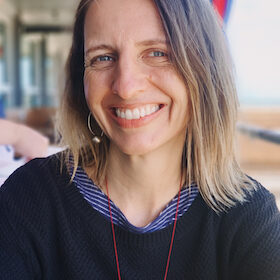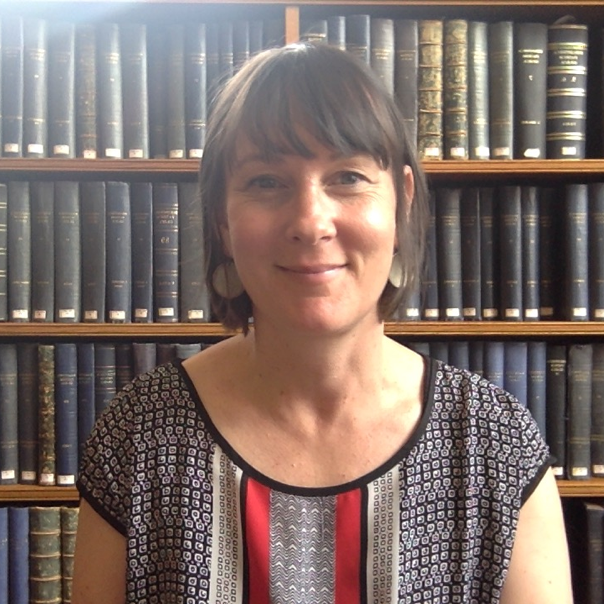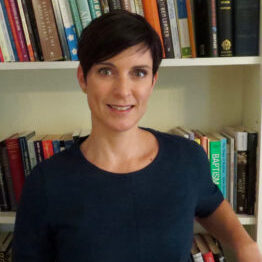Episode Transcript
[00:00:06] Speaker A: You're listening to by the well, a lectionary based podcast, preachers recorded on the land of the Wurundjeri people.
[00:00:19] Speaker B: Hello, everyone. I'm Kylie Crabb. Glad to be bringing you today's podcast for by the well. And it is my absolute great pleasure today to join as my guest, to be joined as a guest by my colleague at Australian Catholic University, Doctor Janine Luttick.
[00:00:36] Speaker A: Hi, Kylie.
[00:00:37] Speaker B: Hello, Janine. It's so great to have you here.
[00:00:39] Speaker A: It's very good to be here. Thank you.
[00:00:41] Speaker B: It's fabulous. So Janine is a biblical scholar. She's expert also in early jewish literature as well as the New Testament. And she is, in particular, really interested and knowledgeable about childhood, including childhood in antiquity and childhood studies in general. And one of the. It would always be wonderful to talk to Janine, but one of the things that's great about it today is that she is just launching a new book which is called Jairus Daughter and the female body in Mark. Coming out with SPL press.
We'll put the details in the show notes. And this is one of our readings today. So it's going to be fantastic to talk to Janine about this reading. So before we get further along, just letting you know that today we're speaking about the readings, the lectionary readings for the 6th week after Pentecost, which is psalm 130, we're going to speak about, and then we're going to speak about mark, chapter five, verses 21 to 43. So a fabulous treat ahead, I hope. Here we go. So, Janine, if we start off with psalm 130, what stands out to you in this reading?
[00:01:58] Speaker A: What an amazing reading. It's a really powerful reading, Kylie. And when I first looked at it, what struck me, and possibly incorrectly, as it turns out, was what I thought was going on was this dialogue with this poet or this person that we don't know much about who's lamenting a situation, and we don't know what's happened. There's no explanation of what's happened to the lamenter or the poet, but they are out of the depths. They cry to God, to the Lord. And we know in the biblical tradition, the depths can relate to water, which is a place of chaos. It's a place where life can be threatened. So this place of, if we imagine it, this place where I'm drowning, a force bigger than me has taken me over. And that's the place out of which the lamenter reaches out to God.
So that's one of the first things that this person's got a voice. They're able to speak to this incredible pain. We know it's pain because the person cries out. There's a vocalisation of their pain and a cry is something that's loud and it's something that's almost primal. So the poetry paints this amazing picture in the first stanza of this incredible place of human pain and cries out, cries out to God.
[00:03:35] Speaker B: Well, I'm curious about you thinking about. You were thinking at the start it was going to be a dialogue and then what happened?
[00:03:42] Speaker A: Exactly. So what happens? I'm expecting a God to respond.
[00:03:46] Speaker B: Yes, that would be part of a dialogue. No?
[00:03:48] Speaker A: Yeah, exactly. But in fact, it seems that this person with this incredible voice is not met by the voice of God, even though God's depicted in sort of human terms, crying to the. Hear my voice. This idea that God's got an ear but God doesn't speak back, which I found really quite provocative and a bit unsettling, actually, until I get to verse five and I hear the poet say, I wait for the Lord, my soul waits.
And again in verse six, my soul waits for the Lord. This repetition of wait, waiting.
And I wondered, for me, that was about this capacity of God, according to the lamenter, to create a space where God actually remains silent. Not to turn God's face on the lamenter, but to create for the lamenter, a space for the lamenter, to articulate their pain and to feel their pain.
So in a sense, there's this incredible presence of God in this. And then the person. The pain's never resolved in the psalm, but I love verse seven and verse eight, where the poet starts to say, oh, Israel, hope in the Lord. So this waiting is connected to hope and there's this realization of this steadfast love, this belief in the steadfast love of God, which is really a really deep commitment of God to the personal healing of that person. Hesed this deep, enduring, personal commitment that the lamenter has, whilst they're in that suffering, has been able to enter into that suffering because of a relationship with God that they believe is one of steadfast love. And in a sense, it's that steadfast love that enables them to be in this great darkness and to lament. So it's an interesting lament because the lamenter stays in that dark place, but by the end of the psalm, there's an orientation towards a future beyond this. But the lamenter.
And God doesn't give what that there's no blueprint for that it has to be lived into.
[00:06:17] Speaker B: Yeah. And it's kind of, I think there's something really powerful in that as well, like completely agreeing with what you're saying about that. It's not resolved at the end, you know, it's not like a, oh, everything's all terrible, and by, you know, eight verses later, it's been tidied up.
But it is also this waiting is not, it's not nothing. You know, it's not inactive. It's not just kind of dead space. There's something really active. I mean, part of the reason we get the sense that it's active is also because it's likened to the role of the. Those, you know, the guard of the night, the watcher. So it's like those who watch for the morning. But it is also, I mean, it's worth knowing that in the Hebrew there, that the word the waiting is hoping. You know, there's not a separation of those concepts. So it is also, I hope I wait, you know, this together, which I think is a kind of, it's an interesting invitation to thinking about that, that space of lament of grief which the psalmist gives such good space for as being an active, valuable, important part. And like you say, even if there's no word from God in this dialogue, there is still a very strong sense of the presence of God. And the communal invitation. As the psalm goes on, it becomes, you know, it's an exhortation to Israel as well. You know, it becomes, it's not just an individual having their dark night of the soul all the way through. It becomes communal, which seems.
Yeah, beautiful to me.
And to think, I mean, the other thing that is on my mind as well is that while it's not resolved, there are signs within the psalm for hope. You know, like, it's not just I'm waiting and hoping hopelessly, like, I'm hoping for something that is just not going to happen. Yeah. Just like kind of completely unreflective hope about, you know, oh, as I hope that I'll wake up tomorrow and have a million bucks or something, you know, like, it's not that kind of thing, obviously.
[00:08:24] Speaker A: Wishful thinking.
[00:08:25] Speaker B: Yeah, it's not wishful thinking. That's right. And one of the reasons we know it's not wishful thinking is it's because it is likened to this practice of waiting, watching for the dawn. So it's dark now, but watching for the dawn. And of course, our, our very human experience knows that the sun does come up each morning. So there is even in the darkest part of the night, there is this confidence that God's turning to us, God's presence with us. And the kind of what comes with the breaking dawn is as much promised as the breaking dawn.
[00:09:00] Speaker A: That's right. I think it's a really interesting.
Gives us a really interesting perspective into one aspect of this idea of suffering and God in that suffering.
The psalmist is really clear that God isn't the cause of the suffering, but God is to be found in the suffering. And in some ways, I certainly believe in a God that would not want that suffering for. Would not want suffering for anyone. But it is part of the human experience, and in fact, one of the most difficult aspects of human experience. And in that, God is found, God is discovered, and God gives space for that. And God respects what people experience in that great darkness. And God stands there and allows people to be in that, but stands there almost like this beautiful figure that is standing there with open arms, almost allowing the person to be and to cry out, but surrounded in that steadfast love.
[00:10:04] Speaker B: Yeah. Yeah. It's a beautiful image. So there's lots of.
I don't know, there's lots of ways of thinking about using this in worship, I think, obviously, and in fact, it's a psalm, I think people would probably know that often is used at funerals and in those kind of explicitly grief kind of framed worship settings, but thinking about using it in a regular service.
But I can see how well it connects to people's everyday experiences of the living, in the demands of. Of human life. You know, I don't know what you reckon about how you would use it. I can see it being great responses in some of the prayers, even in the prayers of the people. Some of these sections about crying out and then affirming the steadfast love. You know.
[00:10:55] Speaker A: You know, when I was looking at this, Kylie, there were so many images that were coming into my mind, not just personal ones, of course, it evokes very personal ones, but also at the global level at the moment. Watch the news.
There is people literally crying out the whole time. And what it means for me, it certainly got me to ask questions around, what does it mean to be complicit in that? What does it mean to be in solidarity with people?
What do I do with the enormous, the emotional responses I have to people who are crying out, yes.
On my screen. And I think that for worship is this idea of the steadfast love that holds people in, that that's us if we're. That we hold this global community today that is just in so many parts of the world and coming to us on our screens all the time, that children, women, men from all stages and walks of life who cry out quite literally at the moment, for me, it's very immediate.
[00:12:06] Speaker B: Yes, yes. Completely agree. Beautiful. Okay, we're going to switch now. We're going to look at Mark, chapter five, starting in at verse 21. We'll be back in just a tick.
[00:12:19] Speaker A: Did you know you could join our Facebook group by the well for extra content and discussion?
[00:12:29] Speaker B: Okay, Janine, this is an exciting reading. It's a long reading. There's quite a lot going on in it, and people might have often focused on different bits or other of the story. So tell us, how are we going to get a handle on this long narrative? What's going on here?
[00:12:45] Speaker A: Okay. Yeah, it is super long and it's super rich. And there's so much been written on this because it's such an amazing set of stories. So let's just get our head around where we go from verse 21 right up to 43. It's amazing because we have two stories. We have this one story that starts off with Jesus crossing in the boat, and he's almost accosted by a synagogue leader, Jairus, whose daughter is dying. And then off they go to follow, off to go to seek out the daughter, and wham.
Mark interrupts that activity by putting in another story about a woman who's been bleeding for a very long time. And that story unfolds.
And that interruption is really important because that interruption means that the time that Jesus could have got to Jairus daughter is lengthened and she dies. So after the story of what I call the bleeding woman, we then deal with the. The repercussions of that interruption and a story of a dying child who's restored to life. So some of us would know that Mark has this very. Or not Mark scholars have this cheesy word explaining this. It's called the mark and sandwich.
[00:14:13] Speaker B: Sandwich, yes.
[00:14:15] Speaker A: Really technical language.
So if you like, the two pieces of bread are the story of Jairus daughter, and the meat in the sandwich is. Is the story of the bleeding woman.
[00:14:29] Speaker B: Yeah. So would you say that there has been a more common preoccupation with the so called meat of the sandwich, then? Like, what's there has there.
[00:14:37] Speaker A: Absolutely.
[00:14:38] Speaker B: Which is a beautiful and important story, right?
[00:14:40] Speaker A: Oh, absolutely. I mean, this story of this bleeding woman is so important, and it's taken the imagination and spirituality and critique of predominantly feminists from the sixties onwards and have opened up so many incredible insights into women in the first century and how they can be understood in this story and also what that means for readers today, women and men today.
But part of that has meant that the story of Jairus daughter has been eclipsed by the amount of attention that's been put on the woman. So my great love at the moment is the story of Jairus daughter.
[00:15:27] Speaker B: I think that's what we might mostly we can put some stuff in the show notes that would be additional kind of things about the bleeding woman. I imagine people have a lot of different ways of engaging with that beautiful story and probably already have some resources on it, but I feel like there are not many resources about how to deal with this Jairus daughter part of the story, which is a super important part of it, it connects to all sorts of things, to including how children are understood in antiquity. What's going on here? What are all the power dynamics in this thing? How are we dealing? You know, so I'm really so excited to talk to you about this, Janine, and to learn more from you about this. So tell us, what's, what's, what are some things that we should know from the outset about what's going on with Jairus daughter?
[00:16:10] Speaker A: Okay, so we've got this image of this child. She's a little girl.
In the Greek, there are diminutives used. They get translated into the English as little daughter.
That not just talks about a young person, and we know she's young because she's twelve years old. We get told that later on. But this idea of little daughter, this use of diminutives in the ancient world, often connoted, they were terms of endearment. So straight away we know that she's a loved child. And Jairus, who's a synagogue leader, in first century, they were fairly prominent people.
Even questions around, possibly some gentiles were synagogue leaders. It was sort of had a bit of a status attached to it in socially, not just religiously, he falls at Jesus feet, which if I'm in first century reading, that's pretty amazing for someone with status to fall at the feet of somebody else. Usually in first century, particularly if I'm coming from a roman perspective, I keep very cool, calm and collected. But this guy mark is telling us this father is really quite distressed. Now, it's really interesting, Kylie, because in first century, if you walked the pavements of Rome in first century and you walking into Rome, think of the appian way. You would have seen loads and loads of funerary monuments. Children died regularly in the ancient world, high mortality rates.
When the children of elite families died, they were often memorialized on these incredible monuments that find their way into Rome. So if I'm coming into Rome, I see all these elite families and I see that their children have died. It's a way that they memorialise them, but also it's a way that they also told me something about the family.
So often on these funerary monuments, I was told that Kylie died at this age and she was modest, pure.
What has died is a person that was going to become the quintessential roman citizen.
And sometimes there was even amazing, sort of very formulaic kind of portraits of the child put onto the monument, often to make them look beautiful and to make them look very. To show that the daughter was unmarried. Because what they're also saying is, this daughter, this person, died before she was able to be married. Now, that's sad, but what that family is also doing is saying, we are a very, very well connected family. So much so that we mourn the death of this daughter because we've lost the capacity to make those connections. But at the same time, taking reassuring.
[00:19:07] Speaker B: You would have had it.
[00:19:08] Speaker A: You would have had it. And she was. She was going to be the great roman citizen. So that's what's going on there. So when someone hears this in first century, they're not surprised by the first part of the story. Of course, a daughter would be beside yourself. If your daughter's going to die and she's from an elite family, nothing. No surprises here.
[00:19:30] Speaker B: Yeah. Is there then something, I mean, you said about we're going to learn that she's twelve, is there anything we should know about, like, when an age is mentioned like that, is this a threshold age, or does it just mean something else about the structure of the family, or.
[00:19:45] Speaker A: Yeah, age is really important. If I'm hearing this in the first century, as soon as I get told the age of somebody and it's in a domestic setting, I'm told straight away that the person is dependent in that family.
[00:20:03] Speaker B: Yeah.
[00:20:03] Speaker A: So there's been a lot of talk about whether the girls on the cusp of puberty and all those associations are.
But I think we often look at those from the perspective of an adult reading, rather than looking at from a child's reading, that when age was put onto funerary monuments, which it often was, and in the literature around describing when children died and the grief around that, the age is put there to reinforce that they are in a family structure, the domestic structure, and that's what I think is really interesting here. Would you like me to talk about this?
[00:20:40] Speaker B: Yes, please. Please. I want to learn all of these things. Yes. Tell us about them.
[00:20:44] Speaker A: So what's really interesting here? The girl, as I've said, she dies.
[00:20:48] Speaker B: Yeah.
[00:20:49] Speaker A: And whilst we may have some queries around, is she dead or not? Because of Jesus talking about she. Look, don't, don't. She's not dead. She's asleep. In the pseudepigrapha, in some of the jewish writings of first century, when a righteous person died, they were often labeled as being asleep. This idea that the righteous person would one day be restored to something.
[00:21:15] Speaker B: Yes.
[00:21:17] Speaker A: So I'm content to say she's for Mark, that he wants to present her as dead, but also already telling us that she's a good person. If I'm hearing this in first century.
So she dies as soon as she dies. That's it.
Jairus doesn't speak anymore.
Jesus goes into the house. He tells some people to leave and brings other people in, unheard of, to enter a roman house and take over from the leader.
He takes three men who are unknown into the room where the daughter is.
So he goes right into the heart of this domestic space.
He takes her by the hand and raises her up. So we've got all those connotations of resurrection, but we've also got this idea in the ancient world, often in funerary, in monuments, the family, especially by the middle of the first century, towards the end, families often were depicted as holding hands. They weren't at the beginning of the first century, but it became part of what happened as a formula for showing family, people holding hands, grasping hands, to show the interconnection. Even on the arepatis in Rome, if you've seen that the imperial family hold the hands of each other and their children. So we get this beautiful image, Kylie, of the girl being restored into a family, but it's not the family in which she dies. The family now is headed by Jesus.
[00:22:51] Speaker B: Yeah.
[00:22:52] Speaker A: And the biological family is part of it. But the biological family has been decentred. There's a new family that's formed in this domestic setting. It includes people that aren't part of the biological structure, which are the three, Peter, James and John. So we have this idea that there's a new sense of what it means to follow Jesus being expressed by Mark in terms of this domestic idea and the domestic. This new structure that Mark is talking about is a really powerful one. And this is where it takes me back to psalm 130, really.
It's a structure where there is suffering, but there is a promise of hope. And that's why the image of this child is really important.
It's not an adult that's restored. It's a child. And with that comes the whole promise of future stability, future hope, future life.
So, and again, we get no blueprint from Mark. Even in 16 eight. Mark is not going to tell us what resurrection.
[00:24:03] Speaker B: Yeah, yeah.
[00:24:03] Speaker A: Just when the winner, 16 eight, which you well know.
[00:24:07] Speaker B: Yes, that's right. So for the listeners about that, this is, you know, the shortest ending of Mark. When the women say nothing to anyone. For they are afraid.
[00:24:17] Speaker A: And I think for Marx hearers at the time, maybe they didn't know they were living in a time of uncertainty and great suffering themselves.
This image of the child is really important in a sense, to say, we don't know what is happening, but there is a sign of hope here. There's a future orientation to a life beyond this.
And this household of Jesus is the bridge between. Or Jesus body is the bridge between suffering and hope. And the hope will be in a new configuration. But what that looks like, we don't know. And in fact, the invitation at 16 eight is the community of listeners then. And our communities today have to live into the reality of what that new paradigm is.
[00:25:03] Speaker B: Yeah. Yeah. Oh, Janine, there's so much in that that I want to talk and think more about.
So part of what is really striking me is this new family. If we're using the found family kind of language, non biological family, which has Jesus at its heart holding hands with this girl that is, as you say, in this time of uncertainty, but looking for hope. And yet there's something in that, isn't there? That's sort of like. I mean, maybe this is overstating the. What we might call realized eschatology of it. But this new family already exists from this moment, right? They're already living into this reality, despite all the imperfections around them, which we all well know as well, you know. But there is something, you know, if we think about the confidence from psalm 130 about waiting for the dawn, there is some sense in which you're already starting to see the sky change color just a little bit. Yeah. You can already see the beginning of the dawn.
So there's something beautiful about that. And also, I don't know if you this jumping now off the reading, but if you have an opinion about the other bit of Mark talking about sort of biological family, where Jesus says, you know, those around me, not, you know, when his mother and siblings are coming to see him, he says, no, no. The ones, the ones who hear me and do what I say are my family. So thinking about, in fact, there is this overturning, isn't there, in Mark, about away from, you know, like I know you said before, the new family includes the biological family. It's not like, you know, definitely renouncing one's biological family, but it's not the priority for this new community.
[00:26:44] Speaker A: Absolutely not. It's a really interesting reading on that score as well. So Mark has a spectrum of how Mark talks about families. Mark affirms biological family. Mark also, when we get to chapter 13, forgive me if I've got that incorrect, will talk, use the image of the family as actually imploding and children starting to destroy their parents as a sign, as the end time. So the biological family, for Mark, I think, is an interesting sort of concept that Mark plays around with quite a bit in order to say that our world is being upturned here and the way that we understand who we are, our identity will not be in some of the categories that we've been used to before.
But having said that, I think if I'm sitting in first century for, particularly if I come from a greco roman, some greco roman worldview, that's not that unfamiliar for me because I'm used to families, biological families being broken down, remarried.
[00:27:51] Speaker B: Intermarried, adoption, larger kinship kind of households, and all your neighbourhoods that are using the same well and whatnot. You know, it's bigger way of living. Right.
[00:27:59] Speaker A: Gladly give myself to someone else to adopt them because it sets up a new connection and it sets up a new network. And I wonder here whether in some ways, what Mark is doing is what a roman, good roman family would do, how to ensure stability, how do we ensure a future?
We actually have to think beyond the biological family. We actually have to develop an identity that is much bigger than that and broader than that.
So in some ways, I think a Roman would find this quite. Someone from a greco roman worldview would find this quite acceptable. What is different, though, is you've got this person of Jesus being the one who the family is around, the new.
[00:28:46] Speaker B: Head of household and the new head of Dominic.
Yeah, that's right. Oh, that's. I'm thinking, too, about, you know, moving to, you know, think about how. How we might reflect on this in our ministry settings, in our preaching, in our worship services. It also strikes me that, you know, it's not that long since we were marking Mother's Day, which is really complicated day, and like a time of great celebration of biological mothers and people who do mothering. But just thinking about the people who gather with us for worship, with complicated stories about their biological families and what kind of hope this offers, that, in fact, there's a restructure of the way community life happens.
[00:29:28] Speaker A: I think when I look at this story now through the lens of family, I think there's a real affirmation for the various permutations of family life today.
I think that's really, really critical. I think the other thing, too, is that the importance of the child as a child. Yes. That the child in this story, she's responsive to Jesus Grasp. She is able to sense, using theological language, revelation.
And I think that, too, the children in our community, sometimes in the communities I belong to, we look at children as we've got to fill them up with faith stuff and church stuff and teaching stuff and scripture stuff, actually, they can fill our bucket as well. They can see things as children that we can't see as adults. They are responsive to God's revelation in a way that only they can see because they belong to a generation that's different to us. They're in a world that their eyes see different things, their ears see different things. Therefore, they see different elements of God that we as adults can't see. So I think for the children in our communities, this is a really important, important affirmation of them, but also a bit of a challenge to the adults.
[00:30:48] Speaker B: Yeah.
[00:30:50] Speaker A: And I think that the figure of Jesus, a little bit challenging here to challenge, really, is the part of familiar something that we really want to subscribe to in the 21st century. Do we need to the male head of the household?
[00:31:03] Speaker B: Yeah, that's right. Well, and also the thing that's striking me is that often when we think about children in biblical stories, we think about them from the perspective of the adult in the story. So we think about this story from the perspective of Jairus, rather than what you're inviting us to do, which is to think about this from the perspective.
[00:31:19] Speaker A: Of the child and maybe talk to the kids, children in your communities.
When do they know that God's close?
When do they know that God's close to them and their families and get a sense, get them to talk to the community about those experiences because they can step into that space.
[00:31:39] Speaker B: Yeah. Wonderful. Hey, Janine, it has been fantastic to speak to you about this, and I'm. Look, obviously, we could talk absolutely all day. In fact, we've recorded for quite a while about this passage. But I recommend your book to all of our listeners for a bit more info from you about this passage, and I'm just. I'm very grateful for you to take the time to speak with us today.
[00:32:01] Speaker A: I am so grateful to be able to talk about this. My passion. Thank you, Kylie.
[00:32:06] Speaker B: Pleasure. Okay, thanks, Janine. See you next time. People.
[00:32:13] Speaker A: By the well is brought to you by pilgrim Theological College and the Uniting church in Australia. It's produced by Adrian Jackson. Thanks for listening.





